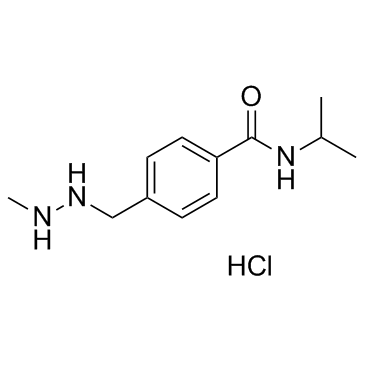Procarbazine hydrochloride

Procarbazine hydrochloride structure
|
Common Name | Procarbazine hydrochloride | ||
|---|---|---|---|---|
| CAS Number | 366-70-1 | Molecular Weight | 257.760 | |
| Density | N/A | Boiling Point | 384.6ºC at 760 mmHg | |
| Molecular Formula | C12H20ClN3O | Melting Point | 223ºC | |
| MSDS | Chinese USA | Flash Point | 148.9ºC | |
| Symbol |


GHS07, GHS08 |
Signal Word | Danger | |
|
[Effectiveness and toxicity of MOPP, ABVD, BEACOPP chemotherapy in first-diagnosed Hodgkin lymphoma with a poor prognosis].
Vopr. Onkol. 59(2) , 59-65, (2013) In a retrospective study during the primary mode MOPP to primary patients LH II/IVAB stages with a poor prognosis rate of CR, 5--and 10-year DFS, OS was 69%, 71% and 68%, 74% and 64%, ABVD--76%, 78%, 83% and 68%, BEACOPP-baseline--73%, 97%, 85% and 82%, respe... |
|
|
[Treatment of advanced Hodgkin lymphoma].
Dtsch. Med. Wochenschr. 138(23) , 1212-4, (2013)
|
|
|
[Necrotizing gastritis in a patient in severe neutropenia].
Pol. Merkur. Lekarski 37(222) , 344-7, (2014) One extremely rare complication of chemotherapy for hematologic malignancies that is burdened with a high mortality rate (50%-80%) is necrotizing gastritis and gastric gangrene as result of poor clinical outcome of neutropenic gastritis (NG). We present a uni... |
|
|
Treatment outcome in children and adolescents with relapsed Hodgkin lymphoma--results of the UK HD3 relapse treatment strategy.
Br. J. Haematol. 165(4) , 534-44, (2014) The purpose of this national retrospective study was to evaluate the outcome in children with relapsed or primary refractory Hodgkin lymphoma [HL] after a primary chemotherapy alone treatment strategy. Between 2000 and 2005, 80 children with relapsed [n = 69]... |
|
|
A chemotherapy only therapeutic approach to pediatric Hodgkin lymphoma: AHOPCA LH 1999.
Pediatr. Blood Cancer 61(6) , 997-1002, (2014) AHOPCA is a collaborative group that designs uniform treatment regimens (protocols) for children diagnosed with cancer in Central America. Based on a preliminary report from one of the AHOPCA centers, AHOPCA adopted a treatment regimen to maintain a good even... |
|
|
Treatment of children and adolescents with Hodgkin lymphoma without radiotherapy for patients in complete remission after chemotherapy: final results of the multinational trial GPOH-HD95.
J. Clin. Oncol. 31(12) , 1562-8, (2013) PURPOSE To minimize the risk of late effects in pediatric Hodgkin lymphoma (HL) by omitting radiotherapy (RT) in patients in complete remission (CR) after chemotherapy and reducing the standard radiation dose to 20 Gy in patients in incomplete remission.Betwe... |
|
|
Prevention and handling of acute allergic and infusion reactions in oncology.
Ann. Oncol. 23 Suppl 10 , x313-9, (2012) Drug hypersensitivity reactions (HSR) are adverse events resembling allergy which occur at therapeutic doses. Both anticancer chemotherapeutics and monoclonal antibodies have the potential for acute HSR. all infusion reactions involve the immune system; howev... |
|
|
Phase III trial of chemoradiotherapy for anaplastic oligodendroglioma: long-term results of RTOG 9402.
J. Clin. Oncol. 31(3) , 337-43, (2013) Anaplastic oligodendrogliomas, pure (AO) and mixed (anaplastic oligoastrocytoma [AOA]), are chemosensitive, especially if codeleted for 1p/19q, but whether patients live longer after chemoradiotherapy is unknown.Eligible patients with AO/AOA were randomly ass... |
|
|
Adjuvant procarbazine, lomustine, and vincristine chemotherapy in newly diagnosed anaplastic oligodendroglioma: long-term follow-up of EORTC brain tumor group study 26951.
J. Clin. Oncol. 31(3) , 344-50, (2013) Anaplastic oligodendroglioma are chemotherapy-sensitive tumors. We now present the long-term follow-up findings of a randomized phase III study on the addition of six cycles of procarbazine, lomustine, and vincristine (PCV) chemotherapy to radiotherapy (RT).A... |
|
|
Intrinsic molecular subtypes of glioma are prognostic and predict benefit from adjuvant procarbazine, lomustine, and vincristine chemotherapy in combination with other prognostic factors in anaplastic oligodendroglial brain tumors: a report from EORTC study 26951.
J. Clin. Oncol. 31(3) , 328-36, (2013) Intrinsic glioma subtypes (IGSs) are molecularly similar tumors that can be identified based on unsupervised gene expression analysis. Here, we have evaluated the clinical relevance of these subtypes within European Organisation for Research and Treatment of ... |